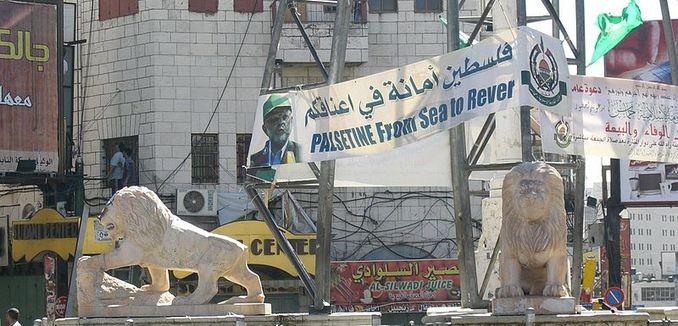Israeli sources who spoke to The Tower today described a “Cold War” being fought in the media between Egyptian authorities and Hamas, as Hamas announced that it was suing [Arabic] an Egyptian news outlet over a report linking the group to a Sinai Peninsula attack that killed 16 Egyptian soldiers.
Hamas spokesman Abu Ubayda said at a Gaza City news conference today that his group was taking Egyptian magazine Al-Ahram to court over a story published this week that linked three members of the Iran-backed terror group — Ayman Nufal, Raed al-Atar, and Mohammed Abu Shamala — to the August 2012 attack. Nufal had once been jailed in Egypt and was one of hundreds of prisoners who broke free in January 2011 amid the chaos of the country’s Arab Spring. Atar, a ground commander in the Gaza Strip, was involved in the 2005 abduction of Israeli soldier Gilad Shalit. Abu Shamala is a top figure in Hamas’s Izz ad-Din al-Qassam Brigades. Al-Ahram had earlier expressed confidence in the accuracy of its report, noting that the information came from inside Hamas and was verified by Egyptian sources.
The Tower spoke with Israeli officials who described the story as part of a media campaign targeting Hamas and driven by Egyptian army officials and the Minister of Defense. The Egyptians are retaliating for vociferous criticism of Egypt that appeared in Hamas outlets after the Egyptian army’s recent campaign to flood smuggling tunnels running between the Hamas-controlled Gaza Strip and the Sinai Peninsula. The Egyptian army, it seems, has decided to use Egyptian media to push back.
Today another Arabic newspaper, Al-Quds Al-Arabi, reported that a group of Hamas members had been captured in Cairo with maps and materials that proved they had specific plans to attack Egyptian targets. Musa Abu Marzuk from Hamas denied the report.
The Tower also spoke to a Palestinian official who pointed out that Egyptian President Mohamed Morsi was keeping silent and is not trying to help “his brothers” from Hamas.
Arabic analysts and media outlets had already been talking about a confrontation between Hamas and Cairo, leaving Hamas scrambling to rehabilitate relations. Earlier this week Hamas spokesman Sami Abu Zuhri had insisted that ties between the group and the Egyptian Muslim Brotherhood — to which Egypt’s ruling government is linked — were deep and historic.
Zuhri blamed tensions on a media campaign that he described as deliberately trying to drive a wedge between Hamas and Cairo. “We would like to affirm that we are not involved in any internal Egyptian affair as we never were before involved in any internal Arab affair,” he said.
Hamas’s Media Battle
Egypt’s operation to destroy the tunnels had triggered fierce and broad denunciations against Egypt from Hamas leaders. The criticism was particularly heated from Mahmoud al-Zahar, the group’s de facto foreign minister in Gaza.
“Everything that’s going on now is an organized campaign to harm the image of the ‘Palestinian resistance,’ and particularly Hamas,” Zahar said at the time to an Egyptian television channel. He emphasized said that despite the “cruelty” of the three-decade reign of Egypt’s toppled president Hosni Mubarak, “he never allowed Gaza to starve.”
Zahar is widely viewed as the flag-bearer for those within his movement opposed to reconciliation with rival Palestinian faction Fatah. The 67-year-old physician has recently said he would cut off his own hand if general elections were held (general elections are a key Fatah condition for reconciliation). He is also considered a committed ally of Iran, a position that puts him at odds with Hamas figures who favor closer ties with fellow Sunnis in Cairo than with the Shiite Islamic republic. As a result Zahar has found himself all but persona non grata in Cairo.
“We do not interfere in the Egyptian arena in the post-Mubarak era,” Zahar said during the interview. “Nor are we in favor of the continued activity of the tunnels in Sinai. But what is the alternative, as long as the Rafah border crossing remains closed?”
The Rafah crossing is the only land interchange between Gaza and Egypt. Palestinian men between the ages of 18 and 40 need special permission from Egyptian authorities to use it.
Oren Kessler contributed to this report.
[Photo: Hoheit / Wiki Commons]




